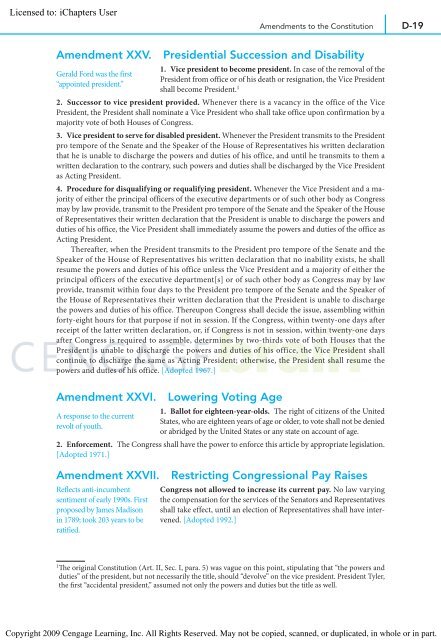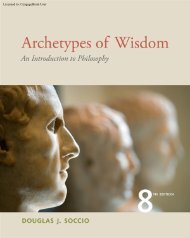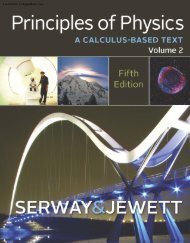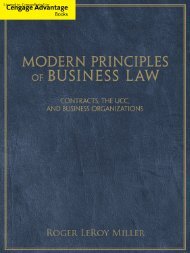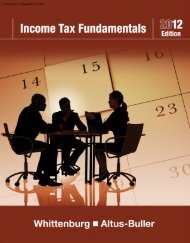03469_00_FM_pi-xxxii pp2.indd - CengageBrain
03469_00_FM_pi-xxxii pp2.indd - CengageBrain
03469_00_FM_pi-xxxii pp2.indd - CengageBrain
You also want an ePaper? Increase the reach of your titles
YUMPU automatically turns print PDFs into web optimized ePapers that Google loves.
Licensed to:<br />
Amendments to the Constitution D-19<br />
Amendment XXV. Presidential Succession and Disability<br />
1. Vice president to become president. In case of the removal of the<br />
President from office or of his death or resignation, the Vice President<br />
shall become President. 1<br />
Gerald Ford was the first<br />
“appointed president.”<br />
2. Successor to vice president provided. Whenever there is a vacancy in the office of the Vice<br />
President, the President shall nominate a Vice President who shall take office upon confirmation by a<br />
majority vote of both Houses of Congress.<br />
3. Vice president to serve for disabled president. Whenever the President transmits to the President<br />
pro tempore of the Senate and the Speaker of the House of Representatives his written declaration<br />
that he is unable to discharge the powers and duties of his office, and until he transmits to them a<br />
written declaration to the contrary, such powers and duties shall be discharged by the Vice President<br />
as Acting President.<br />
4. Procedure for disqualifying or requalifying president. Whenever the Vice President and a majority<br />
of either the principal officers of the executive departments or of such other body as Congress<br />
may by law provide, transmit to the President pro tempore of the Senate and the Speaker of the House<br />
of Representatives their written declaration that the President is unable to discharge the powers and<br />
duties of his office, the Vice President shall immediately assume the powers and duties of the office as<br />
Acting President.<br />
Thereafter, when the President transmits to the President pro tempore of the Senate and the<br />
Speaker of the House of Representatives his written declaration that no inability exists, he shall<br />
resume the powers and duties of his office unless the Vice President and a majority of either the<br />
principal officers of the executive department[s] or of such other body as Congress may by law<br />
provide, transmit within four days to the President pro tempore of the Senate and the Speaker of<br />
the House of Representatives their written declaration that the President is unable to discharge<br />
the powers and duties of his office. Thereupon Congress shall decide the issue, assembling within<br />
forty-eight hours for that purpose if not in session. If the Congress, within twenty-one days after<br />
receipt of the latter written declaration, or, if Congress is not in session, within twenty-one days<br />
after Congress is required to assemble, determines by two-thirds vote of both Houses that the<br />
President is unable to discharge the powers and duties of his office, the Vice President shall<br />
continue to discharge the same as Acting President; otherwise, the President shall resume the<br />
powers and duties of his office. [Adopted 1967.]<br />
Amendment XXVI. Lowering Voting Age<br />
A response to the current<br />
revolt of youth.<br />
1. Ballot for eighteen-year-olds. The right of citizens of the United<br />
States, who are eighteen years of age or older, to vote shall not be denied<br />
or abridged by the United States or any state on account of age.<br />
2. Enforcement. The Congress shall have the power to enforce this article by appropriate legislation.<br />
[Adopted 1971.]<br />
Amendment XXVII. Restricting Congressional Pay Raises<br />
Reflects anti-incumbent<br />
sentiment of early 1990s. First<br />
proposed by James Madison<br />
in 1789; took 203 years to be<br />
ratified.<br />
Congress not allowed to increase its current pay. No law varying<br />
the compensation for the services of the Senators and Representatives<br />
shall take effect, until an election of Representatives shall have intervened.<br />
[Adopted 1992.]<br />
1 Th e original Constitution (Art. II, Sec. I, para. 5) was vague on this point, stipulating that “the powers and<br />
duties” of the president, but not necessarily the title, should “devolve” on the vice president. President Tyler,<br />
the fi rst “accidental president,” assumed not only the powers and duties but the title as well.<br />
Copyright 2<strong>00</strong>9 Cengage Learning, Inc. All Rights Reserved. May not be co<strong>pi</strong>ed, scanned, or duplicated, in whole or in part.


